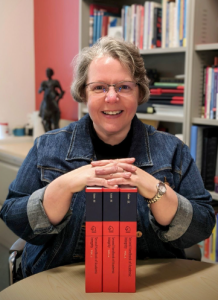The 2nd International Symposium on
Artificial Intelligence in Higher Education 2025
25-26 September 2025
The 2nd International Symposium on Artificial Intelligence in Higher Education will be held virtually on Thursday 25 and Friday 26 September 2025, with the schedule designed to accommodate UK and APAC time zones.
Hear from colleagues, researchers and practitioners as they explore research generated through calls for papers across the Open Access Publishing Association’s journals on the topic of AI in higher education.
Join us for a rich series of keynotes, panels and presentations on artificial intelligence in higher education generated through calls for papers across the Open Access Publishing Association’s journals on the topic of AI in higher education.
The event will have four themes focused on AI: Computer Science Education; Ethical Landscapes in L&T; L&T Discoveries; Staff and Student Wellbeing.
Keynote Speakers: Please click speaker for details

Artificial intelligence has resulted in transformative shifts in teaching, learning, assessment, and academic integrity in higher education. In this keynote, Dr. Sarah Elaine Eaton urges us to move beyond detection-focused strategies to academic misconduct and explore how AI can become a catalyst for educational equity and student success while maintaining academic integrity.
Dr. Eaton argues that there can be no integrity without equity. When thoughtfully and cautiously integrated, AI tools can democratize access to learning support, particularly benefiting students with diverse learning needs, language backgrounds, and varying levels of academic preparation. Join us as Dr. Eaton unpacks her award-winning postplagiarism framework, which transforms our approach to academic integrity in the age of generative artificial intelligence. We will examine academic integrity through the lens of technological advancement, systemic barriers to student success, and advancing equity in higher education.
About Dr Sarah Eaton
Sarah Elaine Eaton, PhD, is a Professor and research chair at the Werklund School of Education, University of Calgary, Canada, and an Honorary Associate Professor, Deakin University, Australia. She has received research awards of excellence for her scholarship on academic integrity from the Canadian Society for the Study of Higher Education (CSSHE) (2020) and the European Network for Academic Integrity (ENAI) (2022). Dr. Eaton has written and presented extensively on academic integrity and ethics worldwide and is regularly invited as a media guest to talk about academic misconduct.
Dr. Eaton is the editor-in-chief of the International Journal for Educational Integrity. Her books include Plagiarism in Higher Education, Academic Integrity in Canada, Contract Cheating in Higher Education, and Fake Degrees and Fraudulent Credentials in Higher Education. She is also editor-in-chief of the Second Handbook of Academic Integrity (2024).

Most discussions about AI in higher education focus on productivity tools or academic threats. But what if we’re missing the fundamental shift happening right in front of us? This keynote explores the emerging Human-AI-World ecosystem where artificial intelligence transitions from being used to being learned with as an equal partner.
Drawing from research in global collaborative learning and cosmogogical approaches, Dr Julie Lindsay presents a framework that reimagines the relationships between humans, AI, and the world as interconnected learning domains. Through live demonstrations and case studies from practice, attendees will discover how learners experience AI differently when positioned as dialogue partners rather than feedback generators, and how this shift enables new forms of assessment that focus on learning conversations instead of isolated outputs.
The session examines three critical relationships: Human-AI partnership through co-creation and augmented capabilities, AI-World interface through real-time global collaboration across time zones, and Human-World connection through authentic problem-solving in real contexts. Participants will explore productive tensions around agency, trust, and risk while developing ethical reflexivity as an integral practice. This is not about adding AI to existing educational structures—it’s about recognising a new learning ecosystem and becoming ecosystem architects who design environments where humans and AI grow together.
Superceded Schedule (Do not use this program. Please click Summary Schedule and Full program PDF buttons above)
| Hobart | Stream 1 | Stream 2 |
|---|---|---|
| 5:00 PM | Theme: GenAI Ethics SI | Theme: GenAI Discoveries |
| 5:20 PM | 1627: Modelling Choice as an Approach to Support Critical Evaluation of GenAI… Wolf, L. & O'Neill, G. (University College Dublin) |
1860: Mapping the Integration of AI into Business Education… Espino, L. & Espino, C. (Bulacan State University) |
| 5:40 PM | 1679: Navigating Ethical Landscapes… GenAI-integrated PD Alharbi, W., et al. (Yanbu English Language & FYI, Saudi Arabia) |
1907: Student-informed teaching & learning framework for AI in Business Schools Drummond, M. & Dale, G. (Liverpool John Moores University) |
| 6:00 PM | 1697: Perceptions of GenAI in the Global South: A Scoping Review Perkins, M., et al. (British University Vietnam) |
1375: Exploring AI Adoption Factors & Innovation Attributes Al-Rahmi, W. M. (Dar Al Uloom University, KSA) |
| 6:20 PM | 1703: Beyond prompts & patterns: Student-staff partnership in an age of GenAI Khoo, E. & Parker-Corney, K. (Massey University) |
1828: Using GenAI for OSCE preparation Lim, A., et al. (Monash University) |
| 6:40 PM | 1622: Equity, ethics & bias in AI in online learning: Roles of CLOs Yeboah, A. K. (State University of New York) |
1457: AI to enhance learning & maintain integrity: Students’ perspectives Hu, M. & Shoecraft, K. (Griffith University) |
| 7:00 PM | Theme: ITED SI | Theme: Computer Science & AI |
| 7:20 PM | 1535: AI Power Up: Prioritising student learning Cutcliffe, K., et al. (UniSQ) |
TBA |
| 7:40 PM | 1545: AI Literacy in Higher Education: From Knowledge to Practice Aref, E. & ElKhoury, E. |
TBA |
| 8:00 PM | 1584: Strategies Enabling AI Help-Seeking Skills Dwyer, N., et al. (Victoria University, Australia) |
TBA |
| 8:20 PM | 1537: GenAI as the learner’s digital collaborator Ramirez, D. & Matheny, J. (Monash University) |
TBA |
| 8:40 PM | 1580: Technological acceptance in AI for STEM learners: Systematic review Ng, J. W., et al. (PSB Academy, Singapore) |
TBA |
| 9:00 PM | Plenary Session: The Postplagiarism Paradigm… — Dr. Sarah Eaton (University of Calgary) Rescheduled to 26 September | |
| 10:00 PM | Day 1 Closing Address — Dr. Marios Kremantzis (University of Bristol) | |
| Hobart | Stream 1 | Stream 2 |
|---|---|---|
| 1:00 PM | 1719: From Policy to Pedagogy… Bayraktar, B. (George Mason University) |
1470: Students’ ChatGPT Use Behaviour… Owan, V. J., et al. (University of Calabar) |
| 1:20 PM | 1716: Teaching with AI: Critical Thinking & Ethical Awareness Taouis, H. B. (Universidad Politécnica de Madrid) |
1451: AI’s Impact on University Teaching & Learning: Student Voices Cespedes, A. A. (Nazarbayev University) |
| 1:40 PM | 1718: Co-Creating AI Policy with Students Lester, A. (Arizona State University) |
1492: Beyond task completion: Using ChatGPT for learning Øby, E. (Kristiania University of Applied Sciences) |
| 2:00 PM | 1705: Raising Ethical Awareness of GenAI through Student Reflection Pedlow, M. & Maldon, J. (University of Western Australia) |
1808: “AI Should Help them Learn, Not Learn for Them” Enright, H., et al. (La Trobe University) |
| 2:20 PM | 1771: Towards a partnership ethics for GenAI in HE Gillette, M., et al. (Gothenburg University) |
1480: Using AI to enhance doctoral supervision (conceptual) Sebopelo, P. (Botswana Open University) |
| 2:40 PM | 1848: Bridging ethical AI literacy gaps Fekete, I. (Budapest University of Economics & Business) |
1532: AI-Generated Errors as a Learning Tool Sakibayeva, B. & Sakibayev, S. (Zhetysu University) |
| 3:00 PM | 1850: When AI Takes the Exam: Grade Inflation & Integrity Bouroubou, G. (Institut polytechnique UniLaSalle) |
1522: ChatGPT Theses — Distinctive Markers Nowacki, L. & Wrochna, A. (Wszechnica Polska UAS) |
| 3:20 PM | 1865: Ethics in the AI Age — AIEOU for Academics Ratner, S. (University of Oxford) |
1497: AI & Critical Thinking in Education — Scoping Review Cong-Lem, N. (Dalat University) |
| 3:40 PM | 1887: AI Policies for Faculty & Students in U.S. HE Qian, J. (Louisiana State University) |
TBA |
| 4:00 PM | 1909: Students’ Perceptions of Ethical Principles in Translation Teaching Nguyen, H. (University of Da Nang) |
TBA |
| 4:20 PM | 1910: Co-designing for Integrity — Ethical AI Literacy in HE Taptamat, N. (The University of Queensland) |
TBA |
| 4:40 PM | Keynote Address: Beyond the Great Reimagining… — Dr. Julie Lindsay (University of Southern Queensland) | |
| 5:40 PM | Day 2 Closing Address — Dr. Cassandra Colvin | |
Registration and Ticketing
Convenors

Dr Cassandra Colvin
Convenor · Lecturer in Educational Experience, Edith Cowan University
Read more
Dr Cassandra Colvin is a Lecturer in Educational Experience at Edith Cowan University, and an experienced Manager in the tertiary sector with oversight of strategy and teams across careers and employability, student support, orientation and transition, learning analytics and evaluation. She has secured a national profile for her work and received awards from professional and government bodies, including the Australian Office of Learning and Teaching.
Cassandra has presented and published widely on learning analytics, international student support, student development and equity. Her PhD (Murdoch University) examined intercultural interactions on university campuses. Professional interests include learning analytics implementations, intercultural relations, student support design and management, staff leadership, and embedding quality and continuous improvement into practice.

Dr Marios Kremantzis
Convenor · Lecturer & Programme Director, MSc Business Analytics, University of Bristol
Read more
Dr Marios Kremantzis holds a PhD in Management Science (University of Southampton). His research spans Data Envelopment Analysis (DEA) and multi-criteria decision analysis, with experience building mathematical models that translate data into operational solutions, including network performance evaluation under DEA.
His cross-disciplinary collaborations appear in Expert Systems with Applications, Socio-Economic Planning Sciences, RAIRO-Operations Research, Supply Chain Analytics, and Agriculture. Marios has organised sessions for the OR Society, DEA45, and ATINER, received EPSRC and BAE Systems funding during doctoral studies, and presented at international conferences. He founded and chairs the OR, Analytics & Education SIG (OR Society), is a Fellow of the HEA, and won the 2023 Bristol Teaching Awards “Inspiring and Innovative Teaching Award”. He serves as Guest Editor for Special Issues on AI-enhanced student engagement in Studies in Higher Education and the Journal of University Teaching and Learning Practice.
Partnerships
Journal of University Teaching and Learning Practice (JUTLP)
CiteScore 7.5A peer-reviewed forum for scholarly reporting of effective and innovative teaching and learning in higher education, bridging rigorous academic research and practical application.
Sponsoring a Special Issue for associated Special Issues. Publication scheduled for January 2026, with online-first upon acceptance.
Intelligent Technologies in Education (ITEd)
Dedicated to advancing research at the intersection of intelligent systems and education (AI, VR/AR, and more), fostering interdisciplinary work that translates theory to practice.
Sponsoring a Special Issue for quality Full Papers not accepted into the JUTLP Special Issue.
Australasian Journal of Higher Education (AJHE)
Aggregates peer-reviewed learning and teaching practice conferences across Australasia, elevating proceedings into curated Special Issues for sector-wide engagement.
Will consider papers from the AU/NZ stream, and may work with select practice papers for a Special Issue.
The AIinHE25 Convening Team is excited to welcome you to the conference: Dr Cassandra Colvin or Dr Marios Kremantzis.
We can’t wait to see you in September!
We can’t wait to see you in September!